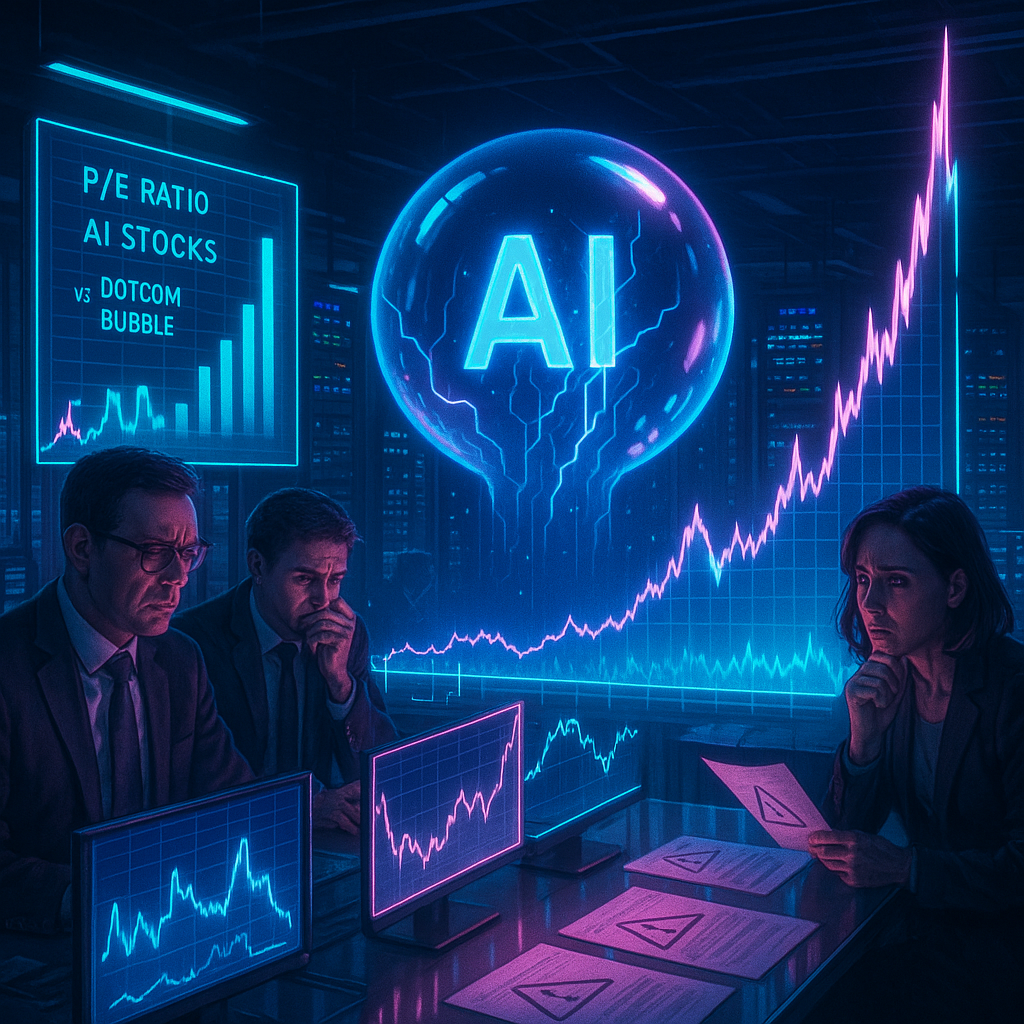Key Takeaways
- Major financial institutions warn of an AI investment bubble that mirrors the volatility and scale of the dotcom era.
- Societies are intensifying debates around AI’s transformative potential, regulation, and the changing landscape of work and knowledge as of 9 October 2025.
- Notizia principale: Financial institutions caution that the accelerating AI investment bubble may parallel the excesses of the dotcom boom.
- Anthropic has launched Petri, a tool designed for autonomous safety audits of AI systems.
- Policy: EU and US lawmakers are proposing broad AI transparency measures to address bias and accountability.
- AI society impact: Rapid workplace automation is accelerating, sparking urgent discussion about evolving job roles and human relevance.
- Analysts emphasize the need for deeper philosophical examination of how AI challenges traditional concepts of intelligence and societal development.
Below is a summary of relevant developments and key perspectives across the AI landscape.
Introduction
On 9 October 2025, major financial institutions raised alarms about the unchecked surge in AI investments. They’re drawing comparisons to the dotcom bubble and highlighting the far-reaching AI society impact as capital allocation, regulatory proposals, and ethical debates all seem to converge right now. Alongside these warnings, the EU and US are advancing new transparency laws, and innovative tools for AI safety are emerging as stakeholders try to find some balance between responsibility and progress.
Notizia principale
Financial Institutions Raise Concerns Over AI Investment Bubble
Leading investment banks and regulatory agencies have issued coordinated cautions regarding a developing bubble in artificial intelligence investments. Goldman Sachs and Morgan Stanley released analyses showing that AI-focused tech stocks are trading at price-to-earnings ratios 85% above long-term averages.
Global venture capital investment in AI startups totaled $452 billion in the first three quarters of 2025, tripling the figure for the same period in 2024. The World Economic Forum’s recent financial stability report highlights significant similarities to the 2000 dotcom bubble, particularly in valuation trends and speculative behavior.
Stay Sharp. Stay Ahead.
Join our Telegram Channel for exclusive content, real insights,
engage with us and other members and get access to
insider updates, early news and top insights.
 Join the Channel
Join the Channel
The Bank for International Settlements observed that current AI valuations signal “excessive optimism” about short-term commercial outcomes. Major institutional investors, including BlackRock and Vanguard, have announced plans to reassess their AI portfolio exposure and apply stricter valuation methods.
Also Today
Progress on UN Framework for AI Governance
The United Nations AI Ethics Council has approved initial guidelines for international AI oversight, marking the first consensus on regulatory standards at a global level. These guidelines focus on human oversight, algorithmic transparency, and environmental considerations.
Tech industry leaders such as Microsoft and Google expressed support for the standards, while advocacy organizations like the Electronic Frontier Foundation argued for stronger enforcement provisions.
algorithmic transparency and accountability remain central concerns as global institutions begin to draft and enforce formalized regulations.
AI Companies Restructure Internal Ethics Oversight
Several leading AI firms have restructured their ethics boards. OpenAI expanded its panel to include climate scientists and human rights specialists. DeepMind established a new public oversight committee with rotating civilian participation.
Also Today
Environmental Impact Innovations
Researchers at MIT have demonstrated a cooling system for data centers that reduces energy consumption for AI training by 40%. This technology merges liquid immersion cooling with neural network optimization, preserving accuracy while lowering computational demands.
With global AI-related electricity use approaching 2% of total consumption in 2025, this development addresses mounting environmental concerns. Cloud service providers including Amazon Web Services and Microsoft Azure plan to deploy the new system in early 2026.
energy consumption in AI model training is under increased scrutiny, driving the search for more sustainable computing solutions.
Launch of AI-Powered Carbon Monitoring Network
A coalition of environmental organizations has introduced a global carbon monitoring network powered by AI. Using satellite imagery and machine learning, this network offers real-time tracking of industrial emissions, enabling greater transparency in environmental compliance.
What to Watch
- The European Parliament will vote on AI Act amendments in Brussels on 15 October 2025.
- The US Senate Committee on Artificial Intelligence will conduct public hearings on AI safety regulations on 17 October 2025.
Conclusion
Warnings from financial sector leaders underscore that the AI society impact is rapidly becoming tangible. As speculative investment grows, efforts in ethics and governance are intensifying, and environmental costs rise. Regulatory action in the EU and US aims to promote greater transparency and accountability as AI reshapes economies and everyday life. What to watch: the European Parliament vote on the AI Act on 15 October and US Senate hearings on AI safety regulations on 17 October 2025.
philosophical examination of intelligence and technology will continue to influence debate as society navigates the promises and perils of transformative AI systems.
AI safety regulations and oversight mechanisms are likely to be shaped by these upcoming decisions and ongoing debates.





Leave a Reply